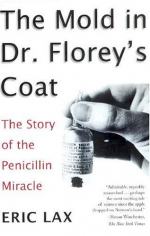|
This section contains 947 words (approx. 4 pages at 300 words per page) |

|
One of the major advances of twentieth-century medicine was the discovery of penicillin. Penicillin is a member of the class of drugs known as antibiotics. These drugs either kill or arrest (bacteriocidal or bacteriostatic effects, respectively) the growth of bacteria, fungi (yeast), and several other classes of infectious organisms. Antibiotics are ineffective against viruses. Prior to the advent of penicillin, bacterial infections such as pneumonia and sepsis (overwhelming infection of the blood) were usually fatal. Once the use of penicillin became widespread, fatality rates from pneumonia dropped precipitously.
The discovery of penicillin marked the beginning of a new era in the fight against disease. Scientists had known since the mid-nineteenth century that bacteria were responsible for some infectious diseases, but were virtually helpless to stop them. Then, in 1928, Alexander Fleming (1881-1955), a Scottish bacteriologist working at St. Mary's Hospital in London, stumbled onto a powerful new weapon.
Fleming's...
|
This section contains 947 words (approx. 4 pages at 300 words per page) |

|


